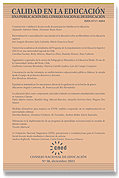La Evaluación Nacional Diagnóstica (END): percepciones y consideraciones para la Formación Inicial Docente desde estudiantes y directores de carreras
DOI:
https://doi.org/10.31619/caledu.n59.1410Palabras clave:
Formación Inicial Docente, políticas educativas, evaluación, rendición de cuentas, educación superior, Evaluación Nacional Diagnóstica (END)Resumen
The article explores the knowledge, assessments, expectations and recommendations of student teachers and their career managers regarding the centralized and standardized evaluation applied to them in Chile (National Diagnostic Evaluation, NDT) to assess the quality of initial training, considering that those evaluated have been largely overlooked in this policy. Utilizing a consecutive mixed design, we conducted individual interviews, focus groups and a survey. The findings offer novel insights for revising the policy. While the participants express support for a national evaluation, they understand it primarily as a tool for improvement. Critiques center around the current instrument’s limitations in terms of standardization and the absence of practical performance evaluation. They also highlight concerns about insufficient information on the instrument and emphasize the need for a detailed description of results to facilitate interpretation and use for improvement. In conclusion, the study advocates for a comprehensive review of the multiple objectives of this evaluation, prompting reflection on the meaning and scope of evaluative mechanisms to strengthen initial teacher training.
Descargas
Publicado
Número
Sección
Licencia
Derechos de autor 2023 Calidad en la Educación

Esta obra está bajo una licencia internacional Creative Commons Atribución 4.0.
Los autores conservan sus derechos de Copyright, sólo transfiere una parte de ellos a la revista aceptando los siguientes términos:
a.Los autores/as conservarán sus derechos de autor y garantizarán a la revista el derecho de primera publicación de su obra, el cual estará simultáneamente sujeto a la Licencia de reconocimiento de Creative Commons que permite a terceros compartir la obra siempre que se indique su autor y su primera publicación esta revista.
b. Los autores/as podrán adoptar otros acuerdos de licencia no exclusiva de distribución de la versión de la obra publicada (p. ej.: depositarla en un archivo telemático institucional o publicarla en un volumen monográfico) siempre que se indique la publicación inicial en esta revista.
c. Se permite y recomienda a los autores/as difundir su obra a través de Internet (p. ej.: en archivos telemáticos institucionales o en su página web) antes y durante el proceso de envío, lo cual puede producir intercambios interesantes y aumentar las citas de la obra publicada.
